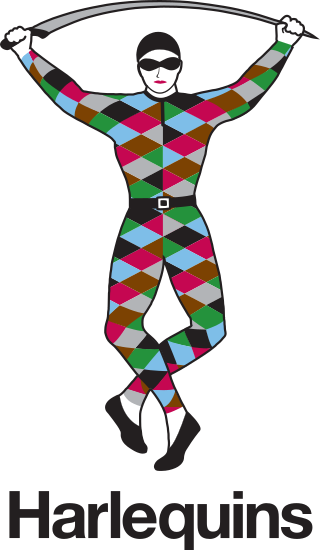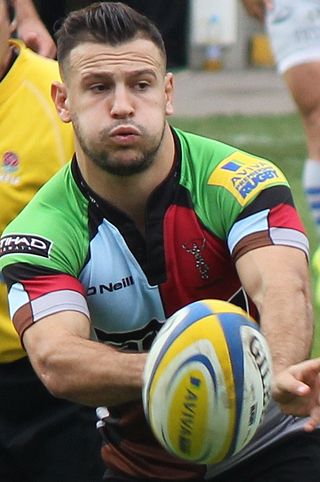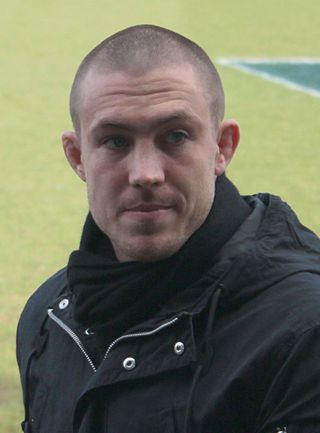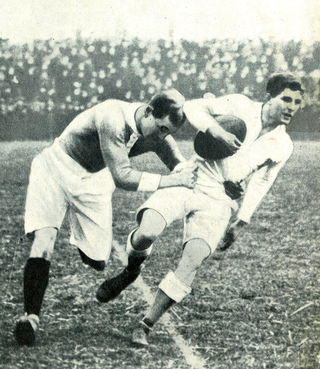Related Research Articles

Adrian Stoop was an English rugby union player of Dutch descent.

Keith Wood is an Irish former rugby union player who played as a hooker at international level for Ireland, and the British & Irish Lions. He also played at club level for Garryowen, Harlequins and Munster. He was nicknamed 'The Raging Potato' because of his bald head, and as 'Uncle Fester' due to his resemblance to the character in The Addams Family. Wood is considered by many to have been the best hooker in rugby union during his era, winning the inaugural World Rugby Player of the Year award, and to be among the best hookers in the history of the game.

Harlequins is a professional rugby union club that plays in Premiership Rugby, the top level of English rugby union. Their home ground is the Twickenham Stoop, located in Twickenham, south-west London.

Twickenham Stoop Stadium is a stadium located in south-west London, England, situated just across the road from Twickenham Stadium. The stadium is home to the Harlequins in Premiership Rugby and has a capacity of 14,800.
Mark Sugden was an Irish rugby union player and rugby author. An outstanding scrum half in the late 1920s and early 30s, he was captain in the 1931 season when Ireland beat England for the third successive time by a margin of a single point. His main claim to fame as a player is that he is credited with developing the dummy pass. He also played cricket for Ireland.

Daniel Stuart Care is an English professional rugby union player who plays as a scrum-half for Premiership Rugby club Harlequins and the England national team.
William John Abbott "Dave" Davies OBE was a Welsh rugby union footballer who played international rugby for England normally positioned at fly-half. He also captained his country.

Ronald 'Ronnie' William Poulton was an English rugby union footballer, who captained England. He was killed in the First World War during the Second Battle of Ypres.

Ugochukwu Chiedozie Monye is an English sports pundit and former rugby union player, Monye played 14 times for England, 241 times for his only club Harlequins and played twice for the British & Irish Lions on their 2009 tour to South Africa. Monye won both the second division and then the Premiership title with Harlequins, as well as winning the European Rugby Challenge Cup.

Nicholas James Easter is an English rugby union coach and former player. He played as a Number 8 for Orrell, Harlequins and the England national team.

Mike Brown is an English professional rugby union player who plays fullback or wing for Leicester Tigers in Premiership Rugby. Brown joined the Harlequins senior team in 2005, having played youth rugby at Salisbury and Melksham, and began playing for the England first team two years later. Between 2021–2022 Brown played a season for Newcastle Falcons.

Chris Robshaw is an English former rugby union player. He was the captain of the England national rugby union team from January 2012 until December 2015. Robshaw's position of choice was in the back row of the scrum, usually flanker.
Reginald Halsey Birkett was an English footballer who played for Clapham Rovers, as well as the England national side. He also played international rugby union for England in 1871, in the first international rugby match. In this match he scored England's first try.
The 1975–76 Australia rugby union tour of Britain and Ireland was a series of matches played by the Australia national rugby union team. The team was referred to as the "Sixth Wallabies", although they were actually only the fifth Australian touring team to undertake a full tour of Britain & Ireland; the "Second Wallabies" of 1939–40 had to return home without playing a game when the World War II broke out.
David Cooke is a former a rugby union international who represented England from 1981 to 1985.

The England rugby union try record progression charts the record number of tries scored for the England national rugby union team by individual players, or rugby footballers as they are still sometimes referred to.
Douglas "Dan'l" Lambert was an English rugby union footballer for Harlequins, England, and the Barbarians. He won 7 caps for England between 1907 and 1911, notably scoring 5 tries on debut against France, and 22 points in another match against France. Lambert was all round sportsman: he was a scratch golfer, played football (soccer) for Corinthian Casuals, and kept wicket (cricket) for Hertforshire. He was killed in action at the Battle of Loos on 13 October 1915.

Francis Nathaniel Tarr was an English international rugby union player. He played centre for the Leicester Tigers and, between 1909 and 1913, won four caps for England, scoring two tries. He also earned three Blues while reading law at Oxford.

Alex Joseph Dombrandt is an English professional rugby union player who plays as a number eight for Premiership Rugby club Harlequins and the England national team.
Ryan Tawanda Manyika is a former rugby union player for Harlequin F.C. in the English Premiership Rugby competition, playing in the half-back positions of scrum-half or fly-half. He was educated at Prince Edward School, Harare before transferring to Brighton College via a sports academic scholarship.
References
- 1 2 3 4 5 Player profile at scrum.com
- 1 2 3 4 5 Steve Lewis, One Among Equals, pages 22-24, 2008 (Vertical Editions:London)
- ↑ Haileybury register, Haileybury and Imperial Service College, Published 1900, p435
- ↑ "rfu.com Wall of Fame inductee profile of John Birkett". Archived from the original on 21 May 2011. Retrieved 10 March 2011.
- ↑ Profile of Reg Birkett on www.englandfootballonline.com
- ↑ Kelly's handbook to the titled, landed and official classes, Volume 95, page 272 (Kelly's Directories, 1969)